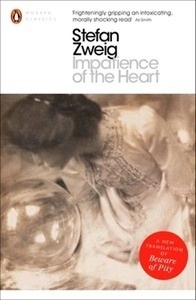The Impatience of the Heart

Editorial Penguin UK
Fecha de edición septiembre 2015 · Edición nº 1
Idioma inglés
EAN 9780141196411
352 páginas
Libro
encuadernado en tapa blanda
Resumen del libro
The great Austrian writer Stefan Zweig was a master anatomist of the deceitful heart, and Impatience of the Heart, the only novel he published during his lifetime, uncovers the seed of selfishness within even the finest of feelings. Hofmiller, an Austro-Hungarian cavalry officer stationed at the edge of the empire, is invited to a party at the home of a rich local landowner, a world away from the dreary routine of the barracks. The surroundings are glamorous, wine flows freely, and the exhilarated young Hofmiller asks his host's lovely daughter for a dance, only to discover that sickness has left her painfully crippled.
It is a minor blunder that will destroy his life, as pity and guilt gradually implicate him in a well-meaning but tragically wrongheaded plot to restore the unhappy invalid to health.
Biografía del autor
Stefan Zweig (Viena, 1881 - Petrópolis, 1942) fue sin duda una de las figuras intelectuales más destacadas del Viena brillante del primer tercio del siglo XX.








